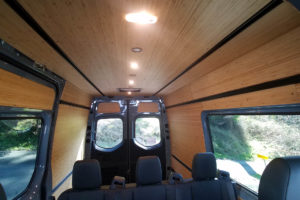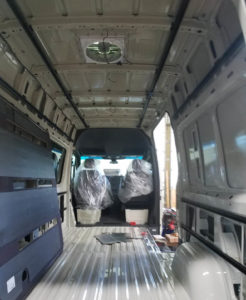The Core Build
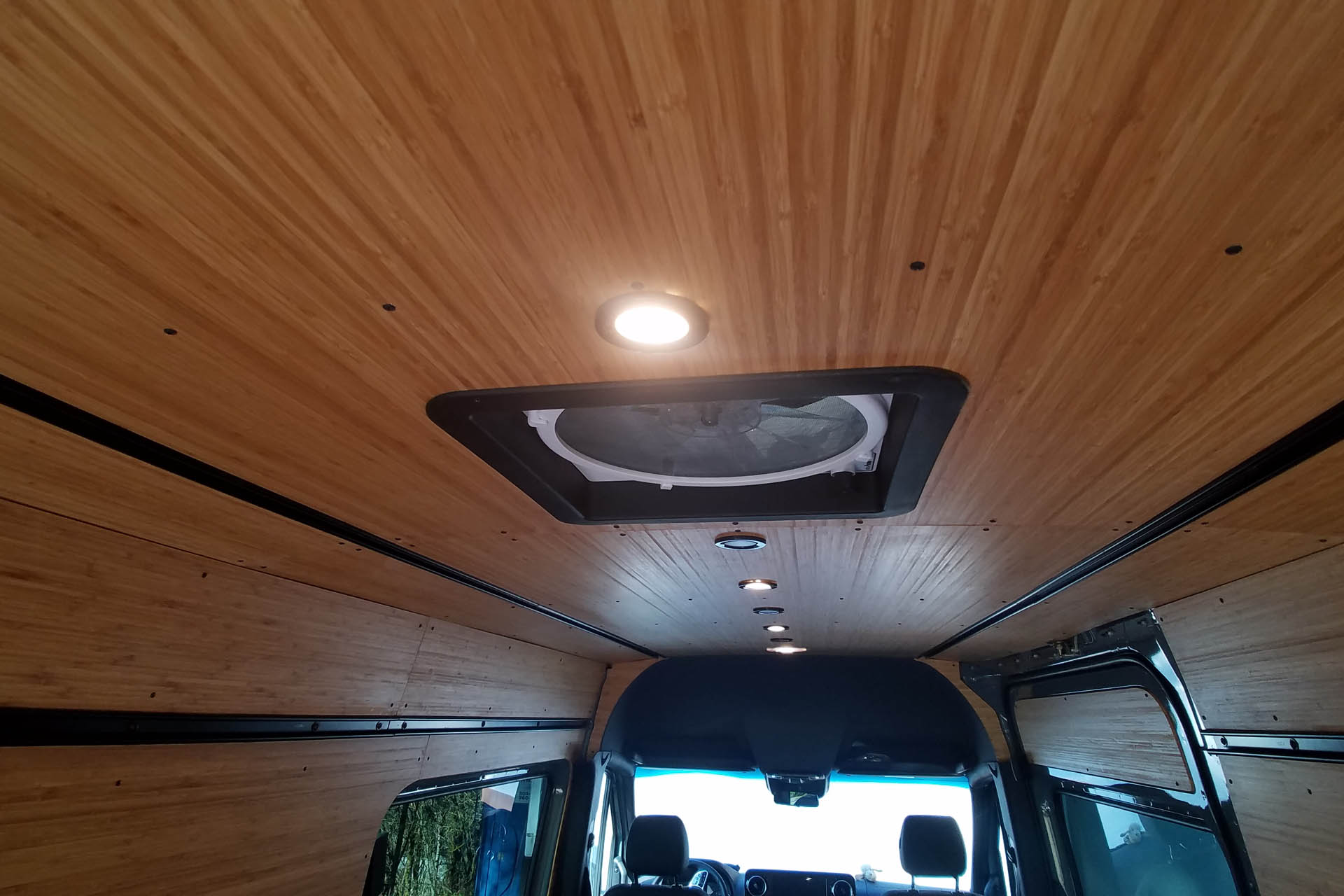
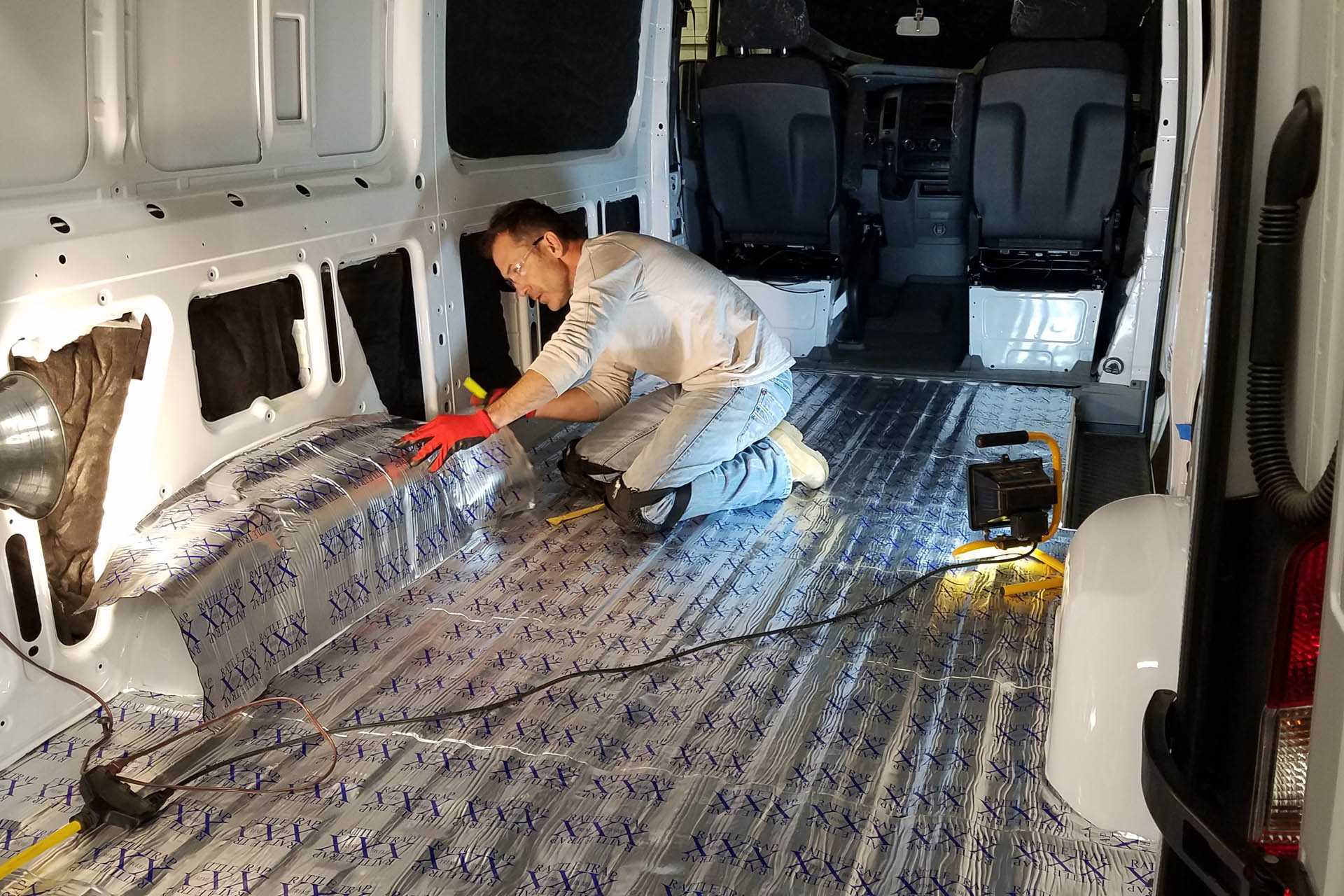
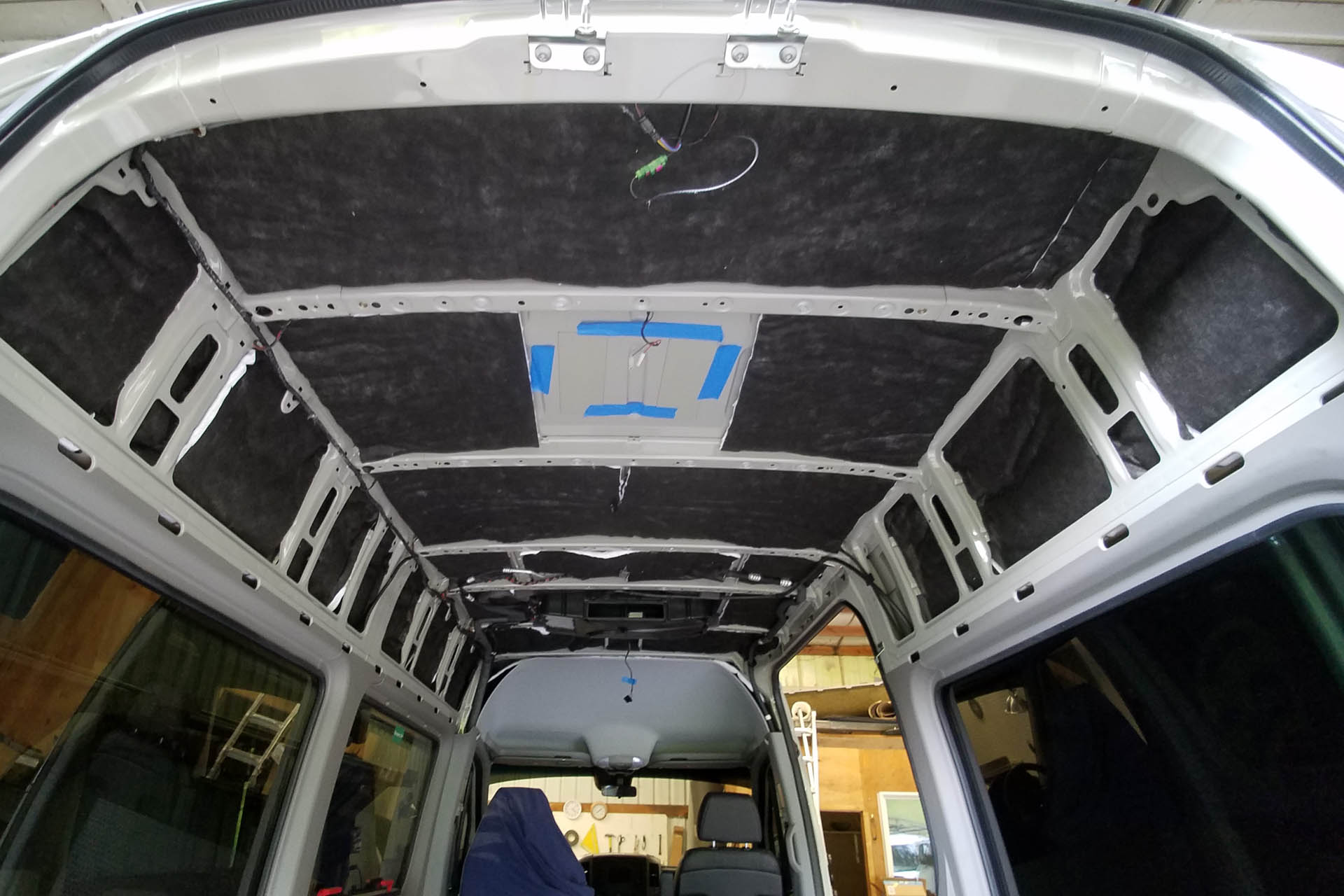

The Core Build is the first step of any Transit or Sprinter build. It all starts with our Smooth Rail Mounting System. A core build can be a standalone project, or the first step of a full build in a multi phase incremental buildout allowing the customer to finish their van in phases.
- Sometimes customers like having Roost’s professional installers do the bare metal vehicle work, allowing them to conduct other portions of the build more on a DIY basis (projects more suited to their talents and available tools).
- Other times it can be helpful to take an incremental approach, allowing a new van owner to use the van a little before making decisions about the final layout or placement of key features.
- And other times, our clients prefer to have us conduct the entire build, utilizing our capable, professional installers to position cabinetry and appliances. This can be done all at once, or in multiple phases.
Whether for budgetary or scheduling reasons, Roost works hard to meet the diverse needs of our clients. Our core build system has been carefully designed to maximize flexibility, versatility, and forethought, offering a cohesive build solution to accommodate any van owners individual goals.
Core Build Details
Below is a list of each element of a typical core build. Click each one for more details and basic pricing information.
1 - Interior Mounting System
About:
The foundation of our modular approach to van building is our Interior Horizontal Mounting System. This provides a permanently accessible, strong and secure mounting point most van build components and accessories. Components installed to our mounting system can be installed, temporarily removed, or re-positioned without the need to remove paneling or drill additional holes in the ribbing or pillars of your van. The smooth slide action of our system allows for precise positioning of components, whether to flush mount two or more cabinets, or a precise gapping between them. Most components can be removed or replaced in minutes with simple tools.
Standard Package:
Installation of our upper and lower mounting system to the interior of the van. Includes ceiling support brackets for increased strength and flex mitigation.
Base Pricing:
- $1775 – Sprinter 144″
- $1975 – Sprinter 170″ or Transit 148″
- $2175 – Transit 148″ Extended
Options & Addons:
- $450 for Passenger Vans with Rooftop AC Unit
2 - Core Electrical Wiring System
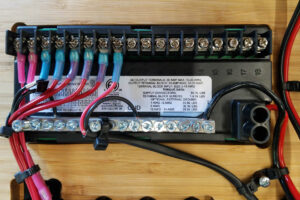
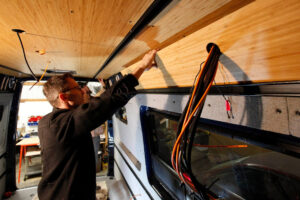
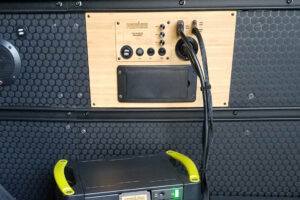
About:
It is critical to install the Core Electric Wiring System comprehensively and properly with forethought of future (often unknown) needs. This is best done prior to insulating or installing paneling or other build components. That’s where The Roost Vans Core Electric Wiring System comes in. It provides a plug and play approach to accommodate the vast majority of applications and uses, as well as anticipating potential future needs and upgrades. The core electrical system consists of Roost Van’s Power Panel, typically located at the C pillar on the driver side. Appropriate gauge wire is routed and run throughout the wall cavities carefully addressing shielding and chaffing points. All the wiring is run from the Roost Vans Power Panel to solar and alternator charge points as well as load (appliance) points. All wiring is connected to the control panel, and future anticipated wiring points not yet in use are capped and coiled in their respective positions, ready for easy connection later.
Standard Package:
Roost Vans proprietary Power Panel: This control panel is the hub of your electrical system. It contains a properly fused distribution block for all end use points, switches and dimmers for user controlled devices, solar, park power and alternator charge lines, and a dual USB plugged DC cigarette type outlet.
Charge Lines: A power plug for external connection to park (shore) power is installed, as well as a charge line from the alternator, and solar panel lines either coiled or through an egress point if applicable (exterior wiring not included in this phase of the build).
Standard Wiring: Appropriate gauge wire is run from the fused distribution circuits to the load (appliance) locations. This includes lighting, awnings, an option for a bunk heater harness, and several strategically placed auxiliary connection points for misc. future use. There are dedicated ports for the water pump and fridge which is typically wired directly from an adjacent kitchen cabinet. However, we also run a heavy gauge auxiliary kitchen power line to the passenger side as an alternate location of the kitchen cabinet.
This is a full electrical package for both simple and complex builds.
Base Pricing:
- $3375 – Sprinter 144″ or Transit 148″
- $3675 – Sprinter 170″ or Transit 148″ Extended
Options & Addons:
- $375 Prewire Espar Bunk Heater wiring harness
- $150 for Extended version of 170″
- $150 – for first AC (household) inlet & outlet
- $95 – Per Extra DC (household) / DC (cig plug) Outlet
- Custom add on’s available such as lighting, fans, Air Conditioner power lines and other needs are typically quoted at time of van drop off
3 - Insulation & Sound Suppression
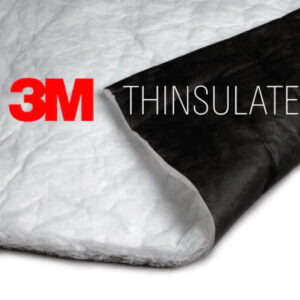
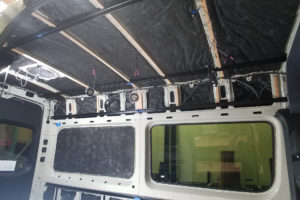
About:
Quality thermal and acoustic insulation is very important to the comfort and enjoyment of your home on the roam. Though often overlooked, sound suppression not only gives you a quieter night sleep, but also helps to dramatically reduce the road noise while you are on the move. And of course, keeping the heat and cold out is another big benefit.
Standard Package:
80 mil, mass loaded vinyl is adhered to most exposed metal surfaces as needed to ensure proper coverage and reduce ‘drumming’ of the metal panels while driving down the road. Then, all reasonably possible cavities in the chassis walls, rear door, and slider door are filled with 1.5in 3M Thinsulate. We fill ceiling ribs and most pillars; pull, insulate and reinstall the front headliner; and insulate the passenger sliding and rear doors.
Base Pricing:
- $1550 – Sprinter 144″
- $1750 – Sprinter 170″ or Transit 148″ (Non Extended)
Options & Addons:
- $300 for Extended version of 170″ or 148″
4 - Ventilation
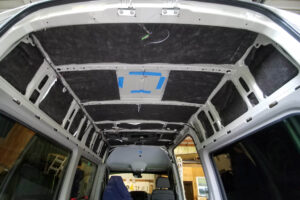
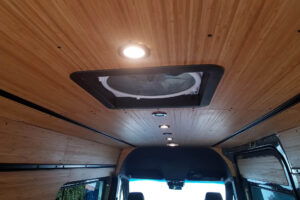
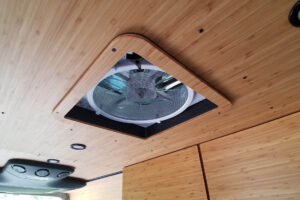
About:
Vent fans are important for proper ventilation of the van. They help remove built up moisture and smell, as well as keep the interior of the van cool in hot weather. The vent fan can be used in the rain, and although not recommended or pleasant, while driving. With the built in thermostat, you can program it to turn on when you’re away if the temperature rises above a set point. Vent fans can be installed in a forward, middle, or rearward location. One is typically sufficient, but some customers prefer two for maximum ventilation.
Standard Package:
We take a double seal approach when installing our vent fans for maximum sealing and longevity. After properly locating and cutting the rooftop egress, a polyurethane adhesive seals the fan to the van roof. Then, a water tight 3M sealing tape further seals around the perimeter. Finally, it’s wired to the pre-existing power system. The interior factory trim ring is trimmed to fit and painted black to match the interior and we add Roost Vans very own bamboo trim ring as standard. Trim ring has pockets on rear for insulated fan cover magnet installation if needed.
Base Pricing:
- $975/ea. Installed – MaxxAir 00-7500 Vent Roof Fan with remote control.
Options & Addons:
- Subtract $125 to remove Roost Vans bamboo trim ring
5 - Window Installation
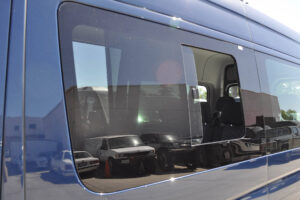
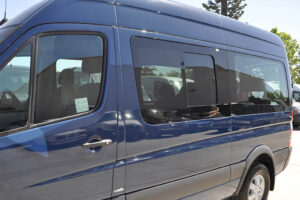
About:
Installing tinted windows is one of the best ways to increase passive ventilation and give a more finished look to the exterior. It’s also the most powerful tool to create openness inside the confines of a small van. We are asked all the time what our opinion or suggestion is for windows. Our answer? Without a doubt, all windows, all around. Always. Most often our clients use their Roosts for traversing the outdoors and seeing beautiful sights. With windows, it’s easier to see those sights you’re traversing to. By having windows all around, you also have better sight visibility while driving and more natural light while hanging inside on a rainy day. Further reduction of the cost of finishing in the mid wall section of the van can also be achieved. If you’re worried about heat, add a bunk heater and if really needed, some insulated window coverings. All of our customers who have opted for more larger windows have not regretted it.
Standard Package:
We primarily install AM Auto vented sliding screened and fixed glue in style windows to assure a no leak seal. After all, this is how windshield have been installed for over 50 years. After locating and cutting the holes, the sheet metal is primed and a trim strip installed on the cut edge. Then adhesive is applied and the window is set into position to cure.
Base Pricing:
- $995/ea full size tinted sliding screened window
- $895/ea full size tinted window
- $1750/pair large tinted sliding screened pill windows
- $1400/pair rear tinted windows
6 - Upper Wall & Ceiling Paneling
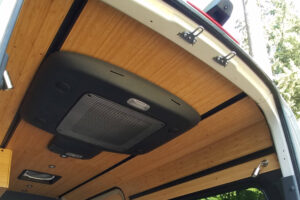
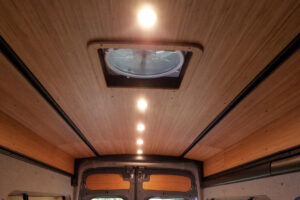
About:
This phase of the core build gives your van a finished look and is one of the most exciting transformations in the build process. Our signature paneling work is serviceable, beautiful, and affordable. In fact, this is one of the main reasons DIY customers bring us their vans from hundreds and even thousands of miles away for the core build phase of their projects. Once the core electric, mounting system, and paneling is in place, the van will have a finished look throughout the remainder of the build process, and/or future modifications. Simply put, after the paneling you should be able to finish the build, as well as make future modifications without ever needing to dig back down to the bare metal walls again.
Standard Package:
Upper paneling consists of the wall above the window or window pocket line and includes the entire ceiling. It also includes the upper portion of the rear and slider doors when applicable. Perhaps the biggest benefit is Roost Vans trimming of the ‘B’ pillar plug. In order to cleanly address the plastic ‘B’ Pillar at the transition point, the factory plugs are heavily modified and fabric wrapped for a professional finished look. For the ceiling, the most common option is Carbonized Vertical Grain 3-Ply Bamboo, finished with Osmo PolyX hard wax oil. However, fabric wrapped Baltic Birch is also available in many color options.
Ceiling lighting is addressed during the upper paneling installation. Factory lighting is replaced with new LED puck lights when appropriate and 3-6 dimmable user controlled puck lights are added (assuming your build also includes core electrical work and panel).
For passenger vans with a rooftop AC unit, the ceiling is dropped to accommodate the AC ducting and factory shroud is modified (see below).
Base Pricing – Bamboo (Most common):
- $3450 – Sprinter 144”
- $3750 – Sprinter 170″ or Transit 148″ (Non Extended)
Options & Addons:
- $200 for Fabric Wrapped Baltic Birch
- $650 for additional labor for passenger vans with rooftop AC unit.
- $450 for Extended version of 170″ or 148″
7 - Mid Wall Paneling & Doorway Treatments
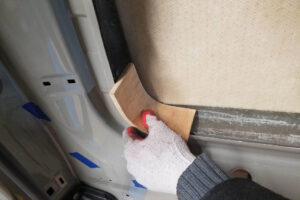
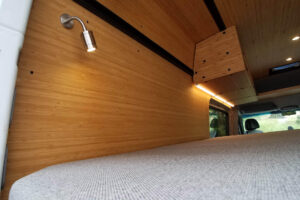
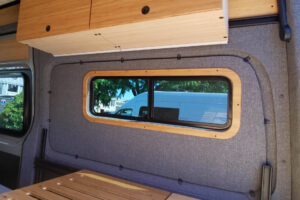
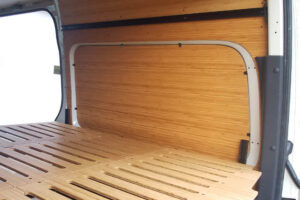
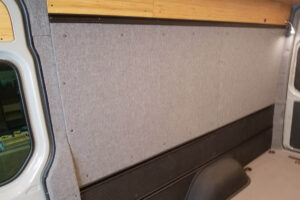
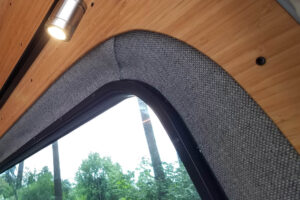
About:
This phase of the core build creates a higher level of finish to your van and is one of the most transformative parts in the build process. And can be one of the most labor intensive. Once the core electric, mounting system, insulation and windows are in place, fabric wrapping and panel installation gives your van a polished look.
Standard Package:
Mid paneling consists of the wall area around the windows and the entirety of the door frames. It starts with fabric wrapping the rear and slider doorway frames. Then, wrapping the interior of the window frames, followed by fabric wrapped frame panels. This is finished with inset bamboo panels when there are no windows.
A note about passenger Vans: Most will have factory molded hard plastic around this area. We recommend retaining it. Our mounting system is designed to not require its removal, and therefore most passenger van builds require no mid paneling work other than fabric trimming of the door frames. The savings in the mid paneling area can offset the additional cost of the rooftop AC work of the upper mounting and ceiling paneling.
Slider & Rear Doorway Frame Treatments:
Our base work includes fabric wrapping the fixed doorway frame area surrounding the sliding door and rear doors. From there we address the window pockets individually based on the desired finished look (see below).
Window Pocket Treatment Options:
- Panel Over: Used to treat an area with no window. A Bamboo or Padded Fabric panel will be installed over the entire window pocket. If pill windows are present, further trimming will need to be done. – Note: a panel over can interfere with Roost Vans Flip-Up kit bed system when installed at greater heights.
- Perimeter Frame: Bamboo or padded fabric facing will be installed only on the flat metal facing around the window but not the ‘window sills’ or inside the frame.
- Perimeter Frame & Transition Wrap: Just like the perimeter frame above, but also includes padded fabric wrapping of the the ‘window sills’ and inside the frame.
- Inset Panels: Used to treat an area with no window or just pill windows. Installation of an inset Bamboo or Padded Fabric panel into the window pocket can maximize side to side sleeping width and provide a valuable aesthetic detail to the van.
- Pill Window Treatment: When an Inset Panel or Panel Over is chosen on a window pocket that has a ‘Pill Window’ installed, additional trimming around the pill window is performed.
Base Pricing
-
- Doorway Frame Treatment – slider and rear doorway frames: $1650 Sprinter / $1975 Transit
- For window pocket treatment (cost per window):
-
- Panel over or Inset Panel (Bamboo or Fabric): $575 regular window pockets / $725 Transit Ext window pockets (each)
- Perimeter Frame Facing Only (Bamboo or Fabric): $375 Sprinter / Transit (each)
- Perimeter Frame (Bamboo or Fabric) & Fabric transition: $675 Sprinter / $825 Transit (each)
- Perimeter Frame (Bamboo or Fabric) & Fabric transition w/ Inset Panel (Bamboo or Fabric): $1150 regular window pockets / $1400 Transit Ext Window Pockets (each)
- Pill Window Trim (Bamboo or Fabric) Add: $375 (each)
-
8 - Lower Wall Paneling
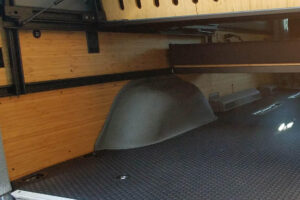
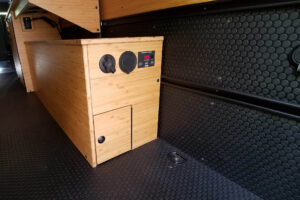
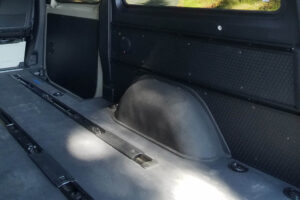
About:
This phase of the core build further gives your van a finished look. Our signature paneling work is serviceable, beautiful, and affordable. In fact, this is one of the main reasons DIY customers bring us their vans from hundreds and even thousands of miles away for the core build phase of their projects. Once the core electric, mounting system, and paneling is in place, the van will have a finished look throughout the remainder of the build process, and/or future modifications. Simply put, after the paneling you should be able to finish the build, as well as make future modifications without ever needing to dig back down to the bare metal walls again.
Standard Package:
Lower paneling consists of the wall area below the window or window pocket line. The most common option is scuff resistant hard vinyl hex coin faced Baltic Birch for ease of cleaning and abrasion, but the lower paneling also includes options for fabric wrapping or bamboo.
Base Pricing – Coin (Most common)
- $1500 – Sprinter 144”
- $1750 – Sprinter 170″ or Transit 148″ (Non Extended)
Options & Addons:
- $400 for upgrade to Bamboo or Fabric Wrapped
- $200 for Extended version of 170″ or 148″
9 - Flooring
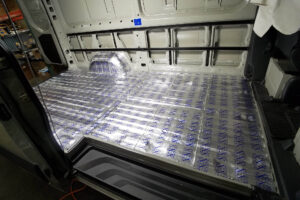
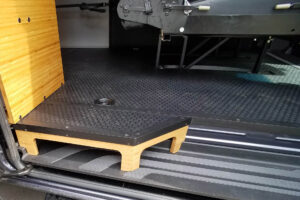
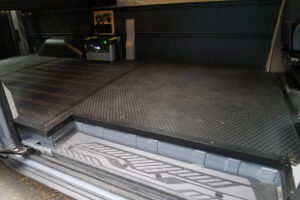
About:
Though flooring is a common element of a core build, it is not always necessary. Some vans have a perfectly suitable factory floor option installed or come standard. Usually though, all customers will benefit from adding additional insulation and sound deadening.
Standard Package:
If a new floor is needed, we will remove any existing flooring if present, such as the Transit soft floor, and build the floor from bare metal up. That consists of 100% coverage of 80 Mil mass loaded vinyl sound deadening material, closed cell foam insulation, and 1/2″ Baltic birch anti skid coin flooring.
If the existing floor is suitable, we’ll reuse it after pulling it insulating underneath as noted above.
In either case, we’ll retain any existing floor tie downs and reinstall preexisting factory trim if possible. If there is not factory trim available to be used, we’ll fabricate black powder coated metal trim to finish out the edges of the flooring.
Base Pricing – Full Floor
- $2850 – Sprinter 144 or Transit 148″
- $3250 – Sprinter 170″ or Transit 148″ Extended
- $3400– Sprinter 170″ Extended
Base Pricing – Insulate and replace
- $1150 – Sprinter 144″ or Transit 148″
- $1400 – Sprinter 170″ or Transit 148″ Extended
- $1500 – Sprinter 170″ Extended
Options & Addons:
- $495 pair of 4′ custom black L-Track Tie Downs
- $750 Sprinter Custom floor extension
Common Add-Ons
There are a couple main build components that we do not consider part of the core build, but are commonly added to the core build for a variety of reasons:
- Bunk Heater: Though we pre-run the power cord for the heater in the Core Electrical System, if the customer wants the thermostat integrated to the main panel, they will want to install the bunk heater at the same time (allowing us to run the cabling for the control unit before paneling).
- Bed System: Typically this is added to a core build when a customer is doing their build in multiple phases either for budgetary or scheduling reasons. The bed adds a lot of functionality in the interim.
- Storage Cabinets: Similar to the bed, a way to add a little functionality during the interim phase of a multiple build process.
Whatever the reason, individual components from the Main Build line of products can be easily added to a core build.

